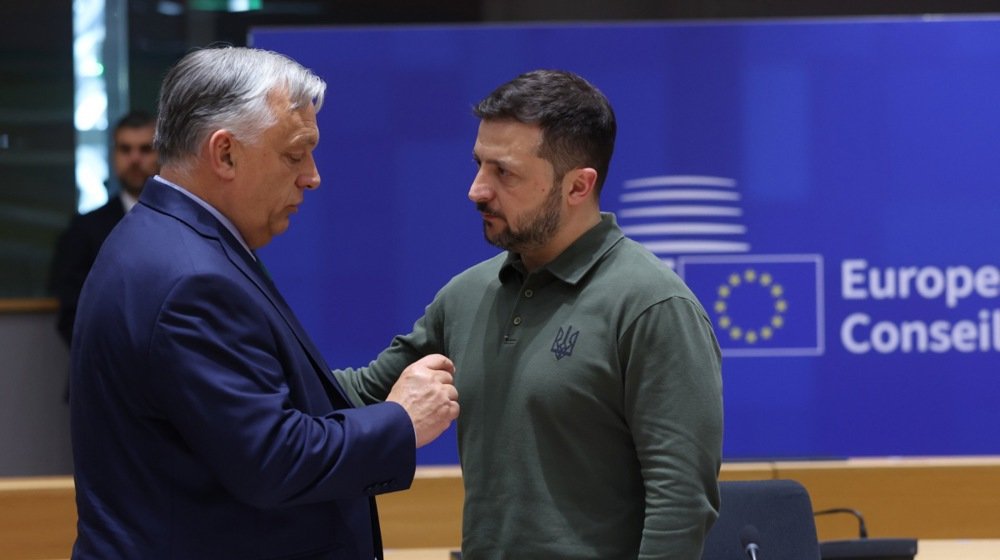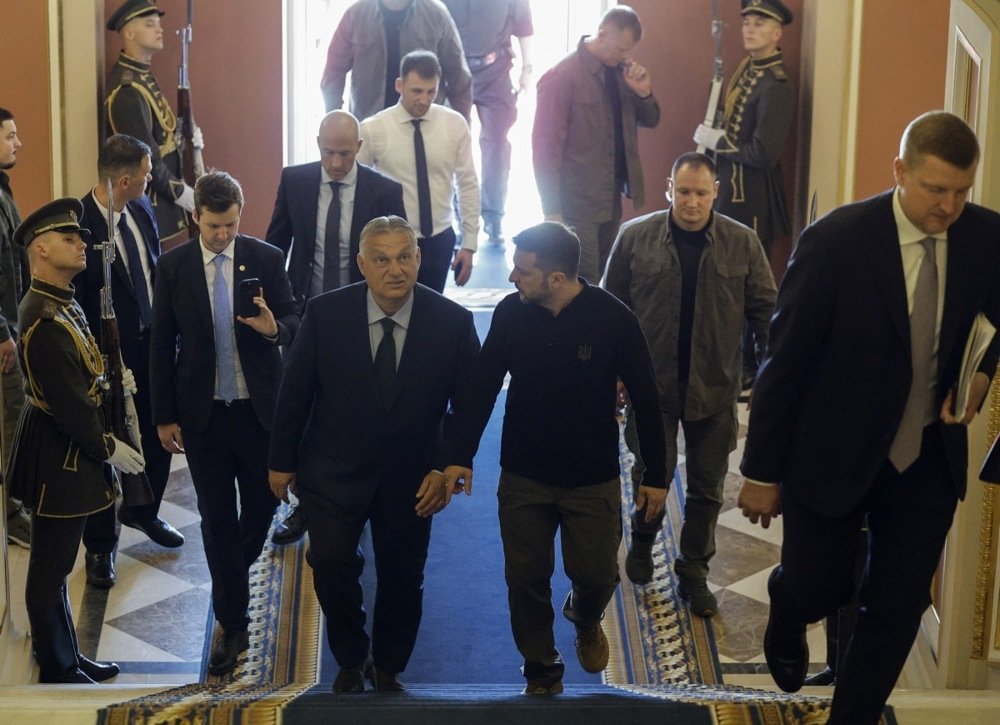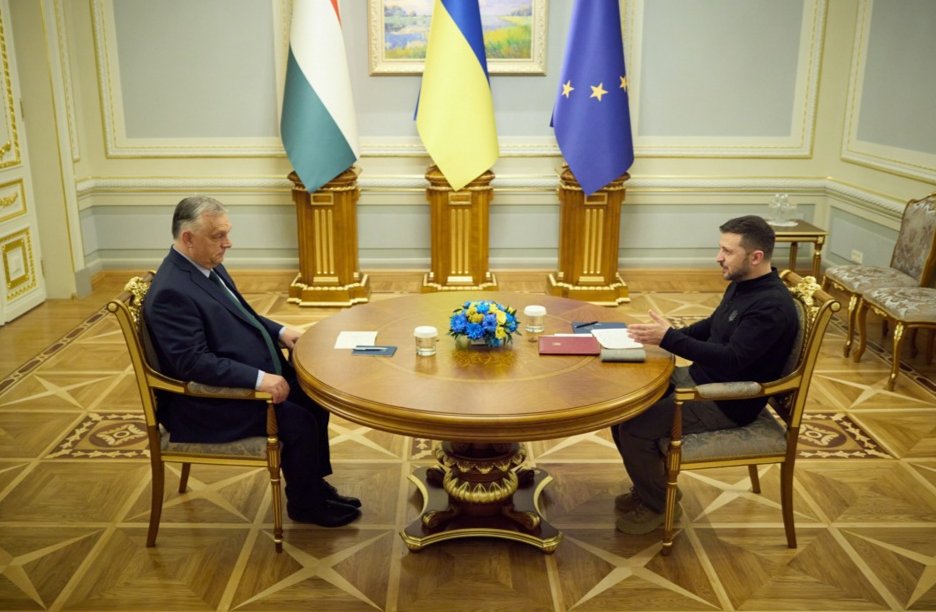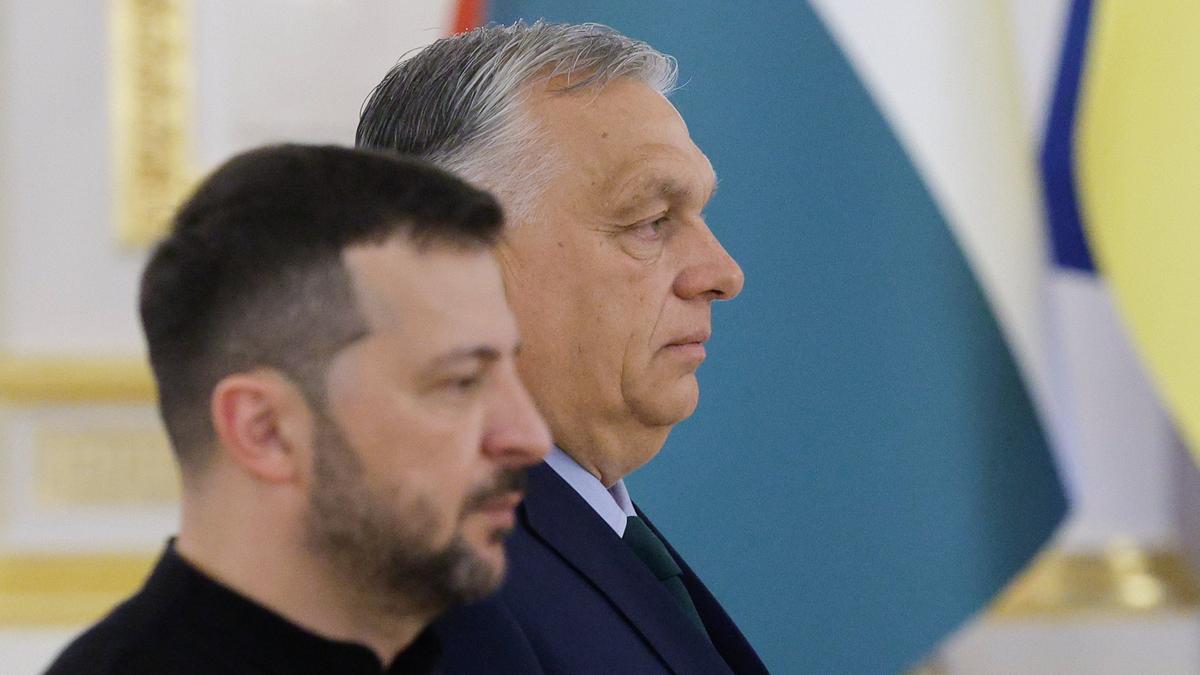Hungary’s Prime Minister Viktor Orbán made a one-day state visit to Kyiv on Tuesday, the day after his country assumed the rotating six-month presidency of the EU Council. Instead of travelling to the Ukrainian capital by train, as nearly all other world leaders before him had done, Orbán entered Ukraine in a bullet-proof motorcade via its border with Hungary in the Carpathian Mountains.
Orbán later said that the visit had been such a high priority for the notorious Putin sympathiser as “the Hungarian Presidency aims to contribute to solving the challenges facing the European Union.”
Zelensky didn’t contradict him, all the more so as that night much of Ukraine had been subject to air-raid warnings and Orbán could see for himself the danger that the country’s cities faced from Russian missiles.
There was no official prior announcement of the visit, which, for security purposes, has been the case with all state visits since the war began more than two years ago.
Nevertheless, Ukrainian media outlet European Pravda reported that during a brief exchange with Zelensky at a recent EU summit in Brussels caught by TV cameras, Orbán, who appeared friendly and even touched the Ukrainian president on the shoulder, had indicated his readiness to visit Kyiv.

Zelensky and Orbán at an EU summit in Brussels on 27 June. Photo: EPA-EFE/OLIVIER HOSLET / POOL
It would still be a stretch to call Hungary and Ukraine’s bilateral relations warm, and not just because Orbán’s last trip to Kyiv was back in 2012, when the pro-Moscow Viktor Yanukovych was president. Much has happened since then, and Budapest’s criticism of Kyiv’s treatment of its 150,000-strong Hungarian-speaking minority in the western Zakarpattia region have only grown louder.
Hungary’s concerns were prompted by a 2017 Ukrainian education law that Budapest perceived as an attempt to assimilate the Hungarian ethnic minority, as it mandated more classes in Ukrainian for schoolchildren being educated in non-Ukrainian-language schools.
Instead of leading to a softening of the Hungarian position, Russia’s invasion of Ukraine in early 2022 was seen by Budapest as an opportunity worth exploiting.
Relations further worsened with a 2022 Ukrainian law on national minorities, which set out to define minority groups and list their rights and obligations, and which came in for severe criticism from the minorities themselves, as well as EU member states and NGOs. As a result, Hungary began to openly oppose Ukrainian membership of both NATO and the EU.
Instead of leading to a softening of the Hungarian position, Russia’s invasion of Ukraine in early 2022 was seen by Budapest as an opportunity worth exploiting, and led it to consistently criticise EU military aid to Ukraine. Hungary also handed Kyiv an 11-point ultimatum at the start of the year, the details of which remain unknown.
But at last month’s peace summit in Switzerland, Ukraine’s deputy prime minister for European and Euro-Atlantic integration, Olha Stefanishyna, indicated that bilateral talks were ongoing and that Kyiv was “more than ready to resolve the 11 problematic points”.
In essence, Budapest appeared to be demanding the overturning of all recently enacted legislation regarding Ukraine’s Hungarian minority, and thus a return to the legal status quo under Yanukovych.
Even if the issues surrounding Ukraine’s Hungarian minority remain unresolved, Orbán’s visit to Kyiv appears to have had a much more ambitious goal, namely that the EU’s virtual outcast believes himself capable of engineering a swift end to the war, which, if true, means that Ukrainian headlines calling Orbán a Kremlin Trojan Horse, weren’t that wide of the mark.

Zelensky and Orbán arrive for their meeting in Kyiv on 2 July. Photo: EPA-EFE/SERGEY DOLZHENKO
Orbán told a press conference held jointly with Zelensky after their talks that he had suggested the Ukrainian president consider an immediate ceasefire along the current frontline, which would mean laying down arms for now, and deciding later how to move from truce to peace.
“I informed the president that his plans require a significant amount of time due to international diplomatic rules, so I advised him to consider doing something a bit different: cease fire, then engage with Russia, because that would speed the pace of these negotiations,” Orbán told reporters.
Orbán freely admitted that his initiative was open to discussion and that he had accepted Zelensky’s counterarguments, describing himself as “very grateful to the president for his frank opinion on this issue.”

Zelensky and Orbán during their talks in Kyiv on 2 July. Photo: EPA-EFE/UKRAINIAN PRESIDENTIAL PRESS SERVICE
However, observers noted that Zelensky avoided sharing his own thoughts on the topic, preferring instead to point out that Hungary had supported Ukraine’s peace proposals at last month’s peace summit in Switzerland.
“To speak in football terms, I think Orban’s visit was an attempt to win an away game.”
Both sides spoke of a need to improve bilateral relations, however, with Zelensky pledging to take into account the aspirations of Hungarian-speaking Ukrainians in Zakarpattia, and Orbán promising to open the first Ukrainian school in Hungary.
“To speak in football terms, I think Orban’s visit was an attempt to win an away game,” the director of the Ukrainian Institute of World Policy, Yevhen Mahda, said. “It is no coincidence that he came to Kyiv at the start of Hungary’s EU presidency. This is Orbán trying to show the European Union that he can solve complex issues.”
“Ukraine should use to its advantage the fact that during the EU presidency Orbán will be forced to adhere to certain European political principles, norms and frameworks. He can’t just play the Hungarian nationalism card. I’m sure Orbán will seek to impose his style of play on Kyiv. A lot will depend on how well the Ukrainians stand their ground,” Mahda concluded.
Join us in rebuilding Novaya Gazeta Europe
The Russian government has banned independent media. We were forced to leave our country in order to keep doing our job, telling our readers about what is going on Russia, Ukraine and Europe.
We will continue fighting against warfare and dictatorship. We believe that freedom of speech is the most efficient antidote against tyranny. Support us financially to help us fight for peace and freedom.
By clicking the Support button, you agree to the processing of your personal data.
To cancel a regular donation, please write to [email protected]

